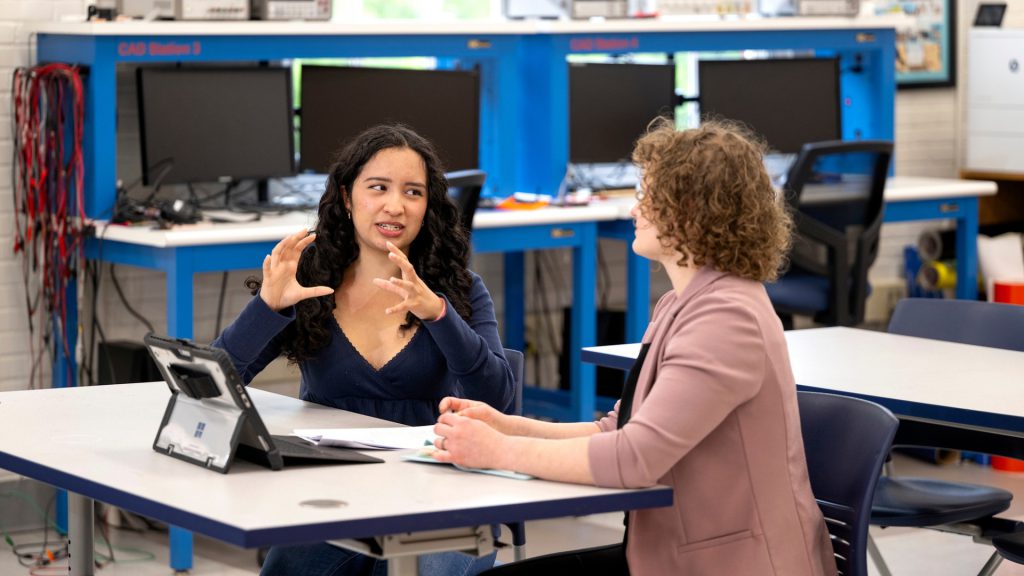Contact:
Mike Ferlazzo
570-577-3212
570-238-6266 (c)
mike.ferlazzo@bucknell.edu
LEWISBURG, Pa. (September 10, 2025) – Before leaving Pittsburgh to come to Bucknell, Aura Chuck Hernandez ’27 had clear ideas about what she wanted — and what she didn’t want — out of her education. “Prior to entering college, I had passions for things like social justice, equity and literature,” she says. “I didn’t want to do anything remotely close to STEM.”
However, it was her experience with Rebekah Taussig’s memoir, Sitting Pretty: The View from My Ordinary Disabled Resilient Body, the 2024 Bucknell Common Reading — coupled with some encouragement from her parents — that pointed her in the direction of Professor Annie Ross, computer science.
“I had heard that Professor Ross worked at the intersection of disability studies and computer science, so I told her that I’d love the opportunity to work together,” says Hernandez, who was encouraged by Professor Ross to apply for the Bucknell-Boulder Just Tech Computing Fellowship. “I took her up on that offer, got the fellowship, and spent the spring and summer of my freshman year working with her on a variety of digital accessibility projects.”
Together, Ross and Hernandez, with the assistance of Bucknell’s Small Business Development Center, conducted accessibility audits for small businesses in the Susquehanna Valley. Their goals were twofold: to figure out how to make websites and e-commerce stores more accessible and to educate people about accessibility. The results of their research, which were presented at the Susquehanna Valley Undergraduate Research Symposium in 2024, provided some encouraging insights.
“We worked with small business owners to understand how more navigable and accessible websites can improve customer experience, and potentially improve sales and search engine optimization results,” says Hernandez, who serves as the teaching assistant for Ross’s digital accessibility course. “They also gained confidence in how to better understand and use technologies that are constantly changing.”
Hernandez’s commitment to accessibility also extends into her work as a Bucknell Community Engagement Scholar. As a volunteer at the RiverWoods Senior Living Community, she taught older residents how to navigate new technologies. “I can see the relief on people’s faces when you explain something clearly and make technology more accessible,” she says. “It reminds me that this type of education is really valuable.”
For Hernandez, her work with Professor Ross has been transformative. Whereas she once saw something like computer science as secondary to social justice and literature, she now sees the discipline as a tool that can amplify the goals of her humanities-based pursuits. “Working with Professor Ross, I was very humbled. I realized that computer science could have a tangible impact on my other interests,” says Hernandez. “I decided to commit to doing a computer science and English — literary studies double-major with the hopes of being able to inform my computer science practices with the kind of ethical components of my literary theory.”
As an English—literary studies major, she has been able to use her research skills to investigate the connections between what she learns in class and her own personal history. “In my literary education, I find myself looking back to my country and the stories of the people who were affected by gendered violence,” says Hernandez, who immigrated to the US from Tamaulipas, Mexico.
In an independent study with Professor Ted Hamilton, English, she examined how Mexican femicide appears in literature throughout Mexico. It’s the kind of project that combines her culture and interests in literature and social justice with her newfound skills in computer science. With the support of the Digital Scholarship Summer Research Fellowship, she built a website to display what she uncovered in her independent study.
“My literary research enriches my perspective as a scholar and my computer science background makes me realize that I can use technology to create a digital humanities project,” she says. “I can create something that makes my research more accessible to more people. I can make something that really has an impact beyond the classroom.”
-30-
To download full image, right click and select Save image as


